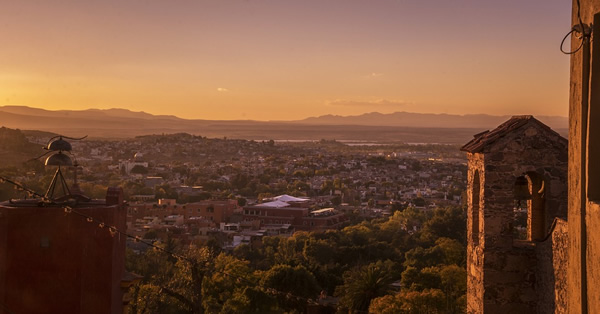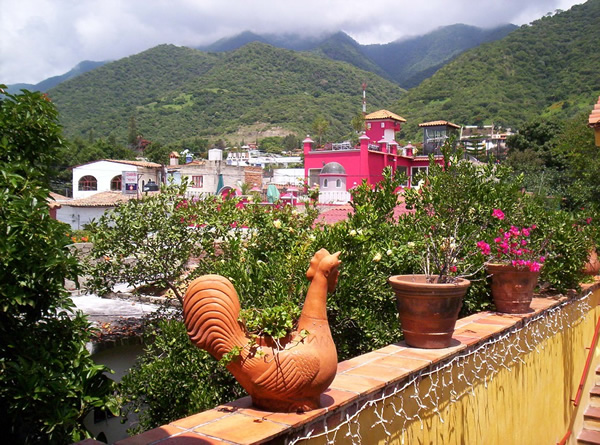Living Abroad in Mexico: The Expatriate Phenomenon
By Rachel Hartman

View of San Miguel, a popular destination for expatriates in Mexico.
|
Mexico: The land of purple flowers, loud mariachi bands, and fresh tortillas. Over the years, it has drawn more than a million Americans to settle among its people. What brings these expats south of the border and what makes them stay? Is it just cheap living, a sense of adventure, a curiosity of other cultures, or a little of all of the above? The answer, like most things in life, is complex. While their reasons vary, the vast majority of expats living in Mexico will agree on this: They love it and don’t want to leave!
Why Expats Come
Expats tend to settle all over Mexico, from coast to coast and everywhere in between. Mexico’s diverse topography includes beaches, mountains, lakes, deserts, and even jungles. Needless to say, there’s something for everyone within its borders. While some congregate in areas with thousands of other expats nearby, others find homes in towns with very low gringo populations.
The Lake Chapala area, in central Mexico, draws many retirees each year. Surrounded by mountains, it is Mexico’s largest lake. And it is just 30 miles south of Guadalajara, one of the country’s major cities. This area, which includes the town of Ajijic on the lake’s northern shore, has been a popular artist and expat destination for years. The Lake Chapala Society, a volunteer organization in the region, consists of over 3,700 members from more than 24 different countries.
Lora Hartwig and her husband Russ currently live in Texas, and plan to move to Ajijic this summer. When they began considering a move to Mexico, Lora says, “We found the Lake Chapala area to be a very beautiful place which offered a less costly but improved lifestyle for us to live mainly on Social Security.” Another attraction was “the fantastic, almost perfect weather and the abundance of English-speaking retirees from both the United States and Canada.”
Jim and Carole Cook moved from Oregon to Ajijic. In addition to the area’s comfortable climate and reasonable cost of living, Jim notes that its location offers great variety. “We’re just half a day’s drive from many things — even the beach,” he says.

View of Ajijic, another popular expatriate destination near Lake Chapala.
|
While Lake Chapala is often noted for its large expat society, gringos can also be found in other, lesser-known regions. Take the city of Torreón, located in north central Mexico, about four hours west of Monterrey. Some guidebooks begin their coverage of Torreón with the words “if you must stay here…” Even though it is low on the tourist list, it still draws a number of expats. Currently, more than 30 foreigners call Torreón “home.” And some of them have done so for decades.
What does Torreón offer? Unlike Lake Chapala, Torreón’s climate is hot and dry. Yet it is often noted as one of Mexico’s safest and friendliest cities. With a metropolitan area of over one million, Torreón has managed to maintain a small-town feel. And its proximity to the United States — just six hours south of the Texas border — means that many of its residents are familiar with Mexico’s northern neighbor.
Wherever they settle in Mexico, expats still find themselves relatively close to the United States. This can be appealing for many who want to experience life in a different culture, but do not want to stray too far from home. It also attracts those who want to divide their time between northern and southern climates.
Jerry Zimpelmann from Eagle River, Wisconsin and his wife chose to build a home along the Costa Maya, approximately four hours south of Cancún. They spend approximately three months of the year in their Mexican house.
About five years ago, the couple started looking in the United States for a vacation home. Jerry notes, “We couldn’t find anything that even marginally hit our criteria, which included a location on the beach where I could snorkel and dive.” Along the Costa Maya, in the town of Mahahual, Jerry and his wife found a lot that did match their criteria.
They built their home there, in an area that is currently in a remote setting. “We’re not on an electric grid,” Jerry says, adding that they have solar power and a generator and use a cistern. Even though the area is not currently developed, it is expected to experience an economic boom in the near future. A dock for cruise ships was recently built, and will bring in an estimated three million tourists per year to the area.
Why Expats Stay
On average, Mexico does offer lower costs of living for Americans; however, that is just one of a multitude of reasons to stay. Some expats are drawn to its rich and complex history, much of which serves as the foundation for today’s Mexico. It also has plenty of places to explore. “Mexico is huge,” notes Jim Cook, adding that many people don’t realize just how much the country has to offer in terms of history and geography.
Living in Mexico also gives expats a chance to slow down and enjoy life. Lora Hartwig says, “Be prepared to relax and leave the stress at home. Moving to a different country means adapting to that lifestyle. Don’t expect them to adapt to yours.”
Adapting to a new way of living is just what Gene Gaudi did. He and his wife run the business Villas Tepetepan & RV Park in Catemaco, Veracruz. Originally from the Chicago area, Gene’s opportunity to live in Mexico came up when he moved to South Padre Island in Texas and started working there. One day, he stopped by a friend’s travel agency and found out she was arranging a trip to Catemaco. Gene says, “I came down, fell in love with the area, which is so lush, with rivers and waterfalls, beaches...and met a beautiful woman. And the rest, they say, is history.”
Gene has now been in Catemaco for six years. He says, “I love everything about Mexico. The people are friendly, and enjoy every day as if it was their last day on Earth.” This sentiment is often echoed by other expats, including myself. Gene adds, “The pace of life is slower, making it hard to run a business, but you learn to go with the flow.”
Another endearing quality of Mexican culture is the tendency to accept people for who they are. Mexicans are usually very forgiving of foreigners who butcher their language, as long as they put in the effort and wear a smile. Similarly, many are used to gringo idiosyncrasies and take them in stride.
And the often talked about stereotype of “friendly people” in Mexico is generally true. Even after living here for eight years, many are eager to invite my husband and myself over to try a special meal, go to a cultural event, and overall, simply make us feel at home. All you need to do is mention to a friend that you would like to see a Mexican wedding or festival, and your social calendar will fill up fast.
Things to Consider Before Moving to Mexico
If you’re thinking about taking the Mexico plunge, Jim Cook emphasizes the importance of researching everything thoroughly. “The more research anyone does, the better,” he says. In addition to browsing the Internet, Jim suggests reading books like The People's Guide to Mexico and The Plumed Serpent by D.H. Lawrence. For insight on Mexico’s history, he recommends Distant Neighbors by Alan Riding and Opening Mexico by Julia Preston and Samuel Dillon.
While Mexico may not make the list of highly developed countries, it is still growing in many ways. “The coastal areas are evolving into one of the premiere vacation areas in the world,” says Jerry Zimpelmann, adding that Mexico’s goal is to be the number one destination for tourism by 2020. “There is a great opportunity for building a middle class through both of its coasts,” he says.
Indeed, the country has plenty to offer, both to its citizens and foreigners. Mexicans are often pleasantly surprised when my husband and I tell them that we love it here. And really, when you add up the warmth of the people, the great places to explore, and the slower pace of life, what’s not to love about Mexico?
If you’re considering a move to Mexico, or have already made the leap, you’ll most likely want to learn about the culture. Above all, remember to keep your eyes open and observe your surroundings. Living in Mexico can be a continual learning process when it comes to culture. For starters, here are some tips to keep in mind:
Do...
-
shake a person’s hand when you first meet them. Handshakes are very important to Mexican culture, and it is considered impolite to not offer your hand.
-
shake a person’s hand the next time you see them, too. Greetings with a handshake (or kiss for women) are vital to Mexico’s culture, and you’ll fit in well by following this rule.
-
talk to your neighbors and get to know the locals. They’ll give you great insight into the country and culture, and help you work your way through daily problems. And you’ll get invited to more social gatherings this way, too!
-
keep an open mind. Mexico is different in many ways from the United States, but it is not necessarily better or worse.
Don’t…
-
expect everything to start on time. Mexicans have a more laid-back approach to social gatherings, and showing up late is very acceptable.
-
try to do too much in one day. Accomplishing one task, such as paying a bill or working on getting your visa, can take longer than you may think. Take things one day at a time, and remember to slow down a bit to enjoy life.
-
live up to certain gringo stereotypes. Some people see an American and expect that they will hand out money freely. Find out from the locals what the usual prices are for taxi rides, market goods, household help, etc. By learning these, you’ll know how much you should be charged for certain items, and can speak up if someone asks for more.
-
blow your nose in front of others, as it is considered rude. Step aside, or find a bathroom, to take care of it, and then return to your guests.
Rachel Hartman has lived in Mexico for the past eight years. She has been published in a variety of magazines and websites, including Senses, Learning Through History, and Gringo.com.
|
